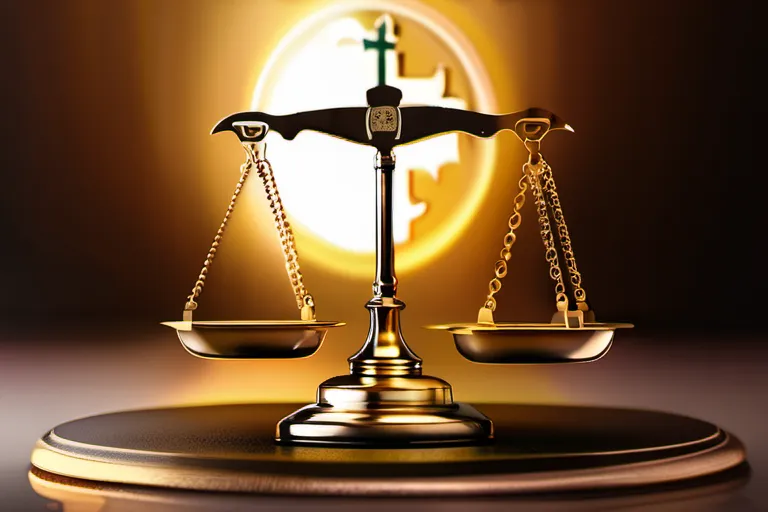Exploring the Intersection of Faith and Economics
In this comprehensive article, we delve into the complex relationship between religion and capitalism. We’ll examine how these two powerful forces intersect, conflict, and coexist in today’s world.
The Historical Perspective: A Brief Overview
The relationship between religion and capitalism has been like two ships passing in the night, each following its own course through history. From the ancient civilizations to modern times, how have these systems navigated their paths, and when did they decide to embark on a journey together?
Consider the early days of human civilization, where religion often dictated every aspect of life, including economic transactions. The concept of “trust” was deeply rooted in religious values—people trusted each other because their beliefs bound them together. Yet, as trade and commerce began to flourish, a new form of trust emerged, one built on contractual agreements. This shift marked the beginning of a complex dance between religion and capitalism.
In the medieval period, monasteries played a crucial role in economic activities, blending religious charity with market transactions. The Church’s teachings on stewardship and justice provided moral frameworks for trade, yet as capitalism grew, it often seemed to challenge these traditional values. How did these two systems coexist? Was capitalism simply an enemy of religion, or could it be seen as a natural extension of certain religious ideals?
The Enlightenment introduced a new era where rationality and individualism came to the forefront, challenging both traditional religion and the emerging capitalist order. Many thinkers questioned whether capital could truly exist without some form of moral foundation, prompting a deeper exploration of how these two systems might intertwine.
In recent history, we see examples like the 19th-century Protestant work ethic, which encouraged hard work and thrift—values that resonated with capitalist principles. But did this mean that religion was simply becoming a tool for economic gain? Or were there deeper spiritual motivations driving these behaviors?
The Theoretical Foundations: Capitalism and Religious Teachings
Can religion and capitalism coexist? It’s a question that has puzzled scholars, theologians, and laypeople alike for centuries. Historically, these two systems have often been viewed as disparate entities, even at times in conflict. But delve into their theoretical foundations, and one finds layers of complexity and interconnection.
Imagine religion as a vast garden where every plant is a distinct belief system, each with its own set of values and teachings. Capitalism can be seen as the gardener, tending to the economic landscape, shaping it with principles like supply and demand. Over time, these two have not only coexisted but also influenced one another in profound ways.
Consider the Beatitudes from Christianity, where Jesus teaches about turning the other cheek and living a life of humility. Can such teachings align with the relentless pursuit of wealth? Or take the concept of stewardship in religions like Judaism and Christianity, which emphasize caring for creation and resources responsibly. This idea has echoes in sustainable business practices that are increasingly valued under capitalism.
In Islam, Zakat, or charitable giving, is a core principle, mirroring the concept of corporate social responsibility (CSR) where businesses give back to society. This blend of religious duty and economic engagement suggests that there is indeed a pathway for religion and capitalism to coexist harmoniously.
But what about the more contentious aspects? The idea of accumulation in capitalism, often criticized as greed, can seem at odds with teachings like compassion and sharing. However, many religious leaders have argued that true wealth lies not just in material possessions but in one’s relationships and spiritual well-being. This perspective opens up possibilities for reconciling these seemingly conflicting values.
Through the lens of history and across various faiths, we see that religion has often provided a moral framework for economic activities. By examining this intersection, we can better understand how to navigate the complexities of today’s global economy while honoring our spiritual beliefs.
Case Studies: Religion and Capitalism in Practice
Let’s delve into real-world examples that showcase how religion and capitalism intersect, blending ethical teachings with economic practices. One prime example is Morocco, where Islam’s influence permeates its economic policies. In Morocco, religious scholars often advise on policy decisions, ensuring that they align with Islamic principles of fairness and justice. This integration isn’t just theoretical; it shapes laws around inheritance, contract law, and even labor rights.
Another notable case is Vatican City, where the Catholic Church has a significant presence in economic affairs through its financial institutions. The Vatican Bank, though small, plays a crucial role in international finance while adhering to strict ethical guidelines. These guidelines often involve eschewing investments in sectors like gambling and armaments, reflecting the church’s commitment to moral values.
Meanwhile, Brazil presents an interesting contrast with its large Evangelical Christian population. Here, religious groups have played a pivotal role in social welfare programs, advocating for policies that support education and healthcare. Their influence has led to significant public spending on these areas, aligning with their teachings of helping the less fortunate.
In India, the teachings of Hinduism inform economic practices, particularly through concepts like self-reliance (Swadeshi) and community welfare. This is evident in initiatives that promote local industries and support artisanal crafts, emphasizing both personal and communal well-being.
These case studies highlight how religion can guide and shape economic policies, ensuring that they reflect ethical and moral values. However, it’s also crucial to recognize the challenges this dynamic poses. How do we ensure that religious influences don’t overshadow democratic processes? And what happens when economic interests conflict with religious teachings?
Conflicts and Controversies: Challenges in the Relationship
Conflicts and Controversies: Challenges in the Relationship
Can religion and capitalism coexist harmoniously? The answer, unfortunately, isn’t always clear-cut. History is rife with instances where these two realms have clashed, leaving behind a trail of ethical dilemmas that challenge both believers and economists alike.
Take the case of corporate philanthropy. On one hand, it’s a beautiful blend—companies giving back to society in line with their values. But what happens when these gifts are seen as mere public relations ploys? How can we ensure that such actions are truly altruistic and not just a cynical bid for good PR?
Another contentious issue is the role of interest rates. In many religious traditions, charging interest (or usury) is frowned upon. However, in capitalism, it’s a fundamental part of financial operations. How can a society that values both principles reconcile these opposing views? The answer seems to be elusive, often leading to heated debates and difficult choices for individuals and communities.
Moreover, the quest for profit at all costs can sometimes come into conflict with religious tenets of compassion and stewardship. When a business prioritizes its bottom line over ethical considerations, it risks alienating both consumers who value morality and religious leaders who preach about social justice.
The question then becomes: Can businesses truly exist without compromising their moral compass? Are there ways to structure capitalist enterprises that align with religious values without sacrificing economic viability?
These conflicts highlight the complex interplay between religion and capitalism, underscoring that while coexistence is possible, it requires constant vigilance and a willingness to navigate challenging ethical landscapes. As we move forward, finding common ground may require creative solutions that respect both principles.
Coexistence and Collaboration: Finding Common Ground
Can religion and capitalism coexist? The answer might surprise you, as history has shown us numerous instances where these two forces not only coexisted but even collaborated for the greater good. Let’s take a look at some examples that highlight their potential to work together.
Consider the case of Socially Responsible Investing (SRI). This approach integrates ethical, social, and environmental criteria into investment decisions, aligning financial gain with moral principles. Imagine a world where religious institutions and businesses can come together to support sustainable projects that not only yield profits but also contribute positively to society—creating a win-win situation for all stakeholders.
Another example is the cottage industries found in many developing countries. These small-scale, traditional enterprises often thrive on local craftsmanship and religious values, providing livelihoods while preserving cultural heritage. Here, religion serves as both a moral compass and an economic driver, creating a harmonious balance between faith and commerce.
In the United States, many religious organizations have partnered with businesses to address social issues such as poverty and education. For instance, companies like Walmart have collaborated with churches to provide job training programs for underprivileged communities. These initiatives not only help individuals improve their economic status but also fulfill a religious duty of compassion and charity.
The collaboration between religion and capitalism is far from perfect; it requires constant dialogue, mutual respect, and ethical considerations. Yet, these examples demonstrate that when approached with intention and commitment, the relationship between faith and economics can be a powerful force for positive change. As we look towards the future, it’s clear that finding common ground will be crucial in navigating the complex landscape of religion and capitalism.
The Future of Religion and Capitalism: Predictions and Projections
As we look to the future, one cannot help but wonder: can religion and capitalism coexist not just today, but tomorrow? Are they destined for eternal conflict, or is there a path toward mutual respect and cooperation that could shape our society’s destiny?
The current landscape suggests that both systems are in constant flux. Religion, with its diverse and evolving beliefs, continues to adapt to new challenges and societal changes. Capitalism, on the other hand, thrives on innovation and progress but also faces criticism for widening economic disparities.
Could it be that these two seemingly opposing forces might find a harmonious balance? Some predict a future where religion plays a more active role in ethical business practices. Imagine corporations striving not just for profit, but also for social justice, inspired by religious values such as compassion and community care. Could this transformation create a new paradigm where businesses are seen as stewards of the greater good?
Others see a darker path, one where religion becomes overshadowed by relentless economic pressures. In this scenario, faith might struggle to maintain its moral compass in an environment driven solely by profit motives. Will the ethical teachings of religions be watered down in favor of short-term gains?
The truth lies somewhere between these extremes. What we can say with certainty is that the relationship between religion and capitalism will continue to evolve. As global challenges grow more complex, both systems may find it necessary to work together to address issues such as poverty, inequality, and environmental sustainability.
Ultimately, the future of religion and capitalism depends on our collective willingness to seek common ground, foster understanding, and embrace cooperation. Will we build a world where faith and economics are not at odds but complementary forces for positive change? The answer lies in our hands as individuals and communities.
Will you be part of this transformative journey?
Conclusion
 By the end of this article, you’ll have a deeper understanding of the intricate dance between religion and capitalism, and be equipped to navigate their ongoing interaction with clarity and insight.
By the end of this article, you’ll have a deeper understanding of the intricate dance between religion and capitalism, and be equipped to navigate their ongoing interaction with clarity and insight.











